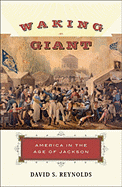

Using a vast and complex canvas, Reynolds brings to life the period when the U.S. woke up to its destiny as a world power--a period marked by outsized characters, political chicanery and just plain craziness. His command of narrative is as impressive as the astonishing trove of facts that portray the development of the country's distinctive brands of culture and politics. At the center of the canvas is that gift to biographers and historians, Andrew Jackson.
Jackson arrived on the national scene in 1815; his leadership of the small American force that defeated 10,000 British at the Battle of New Orleans made him into a celebrity. In the popular mind, he was a potent killing machine and, as his 1824 presidential campaign slogan proclaimed, "Old Hickory, the Nation's Hero and the People's Friend." Although he lost that contested election, he returned in 1828 to win and serve two terms rich in progress, turmoil and controversy. Reynolds says, "Andrew Jackson was one of the rarities of American politics: a man whose personal magnetism transcended his flaws." He was the first president born in a log cabin, the first to be the target of an attempted assassination and, so far, the only president to pay off the national debt. Reynolds's portrait of Jackson will leave readers almost too breathless to utter, "They don't make them like that anymore."
Through Jackson's own passions, Reynolds examines everything from inventions and fads to political party feuds. The age saw expansion of the country to the Pacific Ocean, waves of immigration, transformation of a rural nation to an urban one and our ascension to world power. A parade of crises and shameful presidential policies also clouded the period. Jackson viewed the Bank of the United States as elitist and arrogantly let its charter expire--in due course, under his successor Martin Van Buren, the bank Panic of 1837 ushered in the worst depression up to that time. The hugely expensive and arguably concocted War with Mexico (1846-47) claimed 12,000 American casualties, but the peace treaty brought us California, Nevada and Utah. The Removal Act to relocate Indian tribes typified the racism disguised as paternalistic concern that was the stock-in-trade for the nation's leaders then. Amidst the tumult and change, the question of slavery lurked and festered, from the Missouri Compromise of 1820 to the divisive Wilmot Proviso of 1848. It would be dismissed, denied and evaded until it plunged the nation into the Civil War.--John McFarland
Shelf Talker: A magisterial history of the Age of Jackson (1815-1848) that is also entertaining and surprisingly apt for our own tumultuous age.

